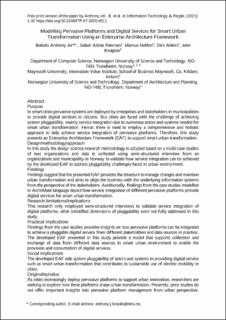Modelling pervasive platforms and digital services for smart urban transformation using an enterprise architecture framework
Peer reviewed, Journal article
Accepted version

Åpne
Permanent lenke
https://hdl.handle.net/11250/2824509Utgivelsesdato
2021Metadata
Vis full innførselSamlinger
Originalversjon
10.1108/ITP-07-2020-0511Sammendrag
Purpose
In smart cities pervasive systems are deployed by enterprises and stakeholders in municipalities to provide digital services to citizens. But cities are faced with the challenge of achieving system pluggability, mainly service integration due to numerous actors and systems needed for smart urban transformation. Hence, there is need to employ a comprehensive and holistic approach to help achieve service integration of pervasive platforms. Therefore, this study presents an Enterprise Architecture Framework (EAF) to support smart urban transformation.
Design/methodology/approach
In this study the design science research methodology is adopted based on a multi-case studies of two organizations and data is collected using semi-structured interview from an organizations and municipality in Norway to validate how service integration can be achieved by the developed EAF to address pluggability challenges faced in urban environment.
Findings
Findings suggest that the presented EAF provides the structure to manage changes and maintain urban transformation and aims to align the business with the underlying information systems from the perspective of the stakeholders. Additionally, findings from the case studies modelled in ArchiMate language depict how service integration of different pervasive platforms provide digital services for smart urban transformation.
Research limitations/implications
This research only employed semi-structured interviews to validate service integration of digital platforms, other identified dimensions of pluggability were not fully addressed in this study.
Practical implications
Findings from the case studies provides insights on how pervasive platforms can be integrated to achieve a pluggable digital service from different stakeholders and data sources in practice. The developed EAF presented in this study provide a model that supports collection and exchange of data from different data sources in smart urban environment to enable the provision and consumption of digital services.
Social implications
The developed EAF aids system pluggability of actors and systems in providing digital service such as smart urban transformation that contributes to sustainable use of electric mobility in cities.
Originality/value
As cities increasingly deploy pervasive platforms to support urban innovation, researchers are seeking to explore how these platforms shape urban transformation. Presently, prior studies do not offer important insights into pervasive platform management from urban perspective. Against this backdrop, this study employs the information systems perspective of digital platforms literature roots in software development and physical product development to depict how the EAF can be employed to describe specific cases that integrate different pervasive platforms deployed by different stakeholders communicating to co-create collective digital services to citizens.